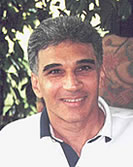All tennis competitors must learn to develop and play in the instinctive, automatic and unconscious mode. The conscious mind, which tends to judge every failure and negative, simply gets in the way of allowing the unconscious and automatic mindset to grow and flourish.
In addition, the conscious mind can lag a whole half a second behind the unconscious analysis that is unfolding on the tennis court. Rita Carter in "The Human Brain Book" clearly states the conscious mind's limitations.
"The brain registers events via the sense organs almost immediately, but it takes up to half a second to become conscious of them. In order to generate effective responses in a fast-changing environment, the brain must plan and execute moment-by-moment actions unconsciously" (2009, page 118).
Players must learn to put aside the conscious mind when training and stop judging and micro-managing every little mechanical move that is made. A player does not think his way through a stroke, he must feel (using the sensory system) his way through it.
But is there a place for the conscious mind when learning and playing tennis? Yes, the conscious mind's function is crucial in the development of a player's game. But the conscious mind must recognize its limitations and step aside when unconscious, instinctive play is being developed.
The conscious mind is like a General who controls the big picture and macro-manages the troops. The troops are like the unconscious mind carrying out the details while the General steps aside. The problem develops when the General (the conscious mind) decides to control and micro-manage the troops. The General cannot possibly know every little minute detail that is necessary to successfully deploy the troops. He must give the orders then trust the training of the troops to carry out the plan. So it is with a player's tennis game! The conscious mind is the General and must give the body simple commands, like "hit down the line" or "hit cross court," then get out of the way and let the unconscious carry out the task.
Here are a few jobs the conscious mind is responsible for when training and developing a tennis game. First, the conscious mind must keep the player motivated to get up and go to practice. The discipline required to stay in the grind, practicing week after week, is delegated to the conscious mind. No unconscious training will take place without this basic but essential mindset.
Second, once at the courts the conscious mind must encourage the body to practice, really practice. No loafing allowed! The conscious mind must keep things positive even if the body is tired or is failing. The unconscious does not judge failure or success. All the unconscious wants is more stimuli, whether good or bad, to figure out the stroke. Here is where the General must keep the action going but stay out of the way, making only subtle changes while allowing the unconscious time to learn the stroke. A player must trust the body's self-discovery ability and not over-think or cause paralysis by analysis.
Third, when a player reaches a plateau and does not feel like he is getting better, the conscious mind can save him. When a player stops learning he tends to unconsciously think he has reached his potential, especially after months of no improvement and he is on autopilot. He settles down and thinks, "This is it. I have reached my talent level." But that is not true.
Joshua Foer, in his book "Moonwalking with Einstein: The Art and Science of Remembering Everything," addresses this exact dilemma. His solution says it best:
"The secret to improving at a skill is to retain some degree of conscious control over it while practicing - to force oneself to stay out of autopilot. With typing, it's relatively easy to get past the OK plateau. Psychologists have discovered that the most efficient method is to force yourself to type 10 to 20 percent faster than your comfort pace and to allow yourself to make mistakes. Only by watching yourself mistype at that faster speed can you figure out the obstacles that are slowing you down and overcome them. By bringing typing out of the autonomous stage and back under conscious control, it is possible to conquer the OK plateau" (2011 ed., page 172).
This means a player who has reached a plateau must begin consciously pushing himself or herself during the practice sessions to a point of failure. This will force the player out of the autopilot mode and begin the learning process once again! To move out of the OK plateau you must push yourself out of your comfort zone.
Yes, the conscious mind has a critical role in the learning process as well as match play. The key is to know its limitations. If you think the conscious mind is going to make the intricate mechanics of your strokes work, you are sadly mistaken. But if you think your conscious mind can create the conditions to allow those mechanics to work, your Tennis Warrior Mindset is happily shining through.


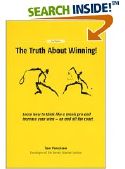
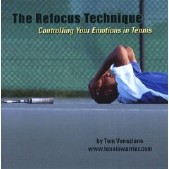
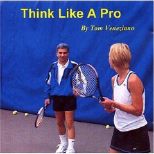
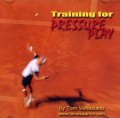



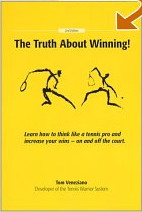
 You will join 13,000 other subscribers in receiving news of updates to the Tennis Server along with monthly tennis tips from tennis pro Tom Veneziano.
You will join 13,000 other subscribers in receiving news of updates to the Tennis Server along with monthly tennis tips from tennis pro Tom Veneziano. 